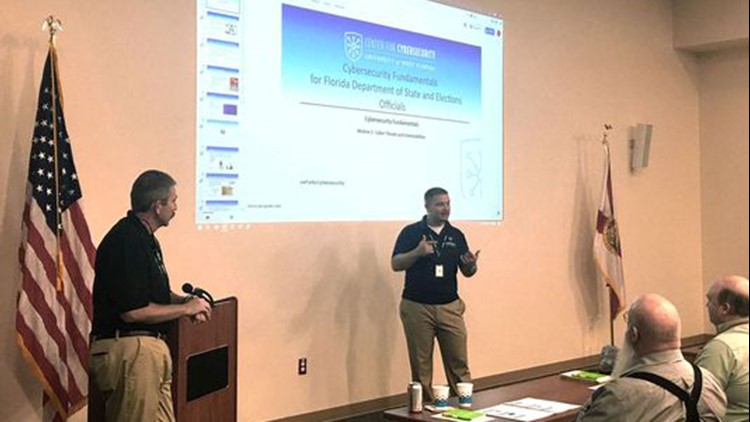The University of West Florida Center for Cybersecurity provided security training to key Florida elections personnel to help shore up the state’s defenses ahead of the 2018 elections.
During the month of June, the UWF Center for Cybersecurity conducted cybersecurity training courses in Tallahassee, Miami, Orlando and St. Augustine focused on teaching supervisors of elections and their key staff how to thwart online attacks and to understand and implement cybersecurity standards.
Although there is no evidence cyberattacks impacted the vote tallies or the results of the 2016 elections, the Department of Homeland Security reported that Russian hackers probed the systems of 21 states. The U.S. Department of Justice announced Friday that 12 Russian nationals had been indicted for alleged 2016 hacking activities.
Investigative documents released last year revealed Florida was among the states that were targeted, and a Tallahassee-based company that provides elections-related software to most of Florida’s elections offices was impacted.
In a written statement, Florida Secretary of State Ken Detzner said the state is taking significant steps to protect against the growing threat of cybercrime, and that “the recent trainings that were conducted by the UWF Center for Cybersecurity are yet another tool in election officials’ arsenal.”
The UWF Center for Cybersecurity, in partnership with Metova CyberCENTS, utilized the Florida Cyber Range for hands-on activities and demonstrations throughout the courses. The program focused on an introduction to cybersecurity processes, threats, vulnerabilities, risk management, policy frameworks and incident management.
Paul Lux, Okaloosa County Supervisor of Elections, said he had experience in the information technology side of the job, but not all supervisors did. He added that statewide, uniform training was important because going into the recent election, each county had varying levels of resources and almost none have a full-time cybersecurity staff.
Through the training and beyond, “we’ve been doing our due diligence to make sure we do everything we can with the resources we have to ensure we’ve done everything we can to make sure the election is secure.”
Lutz said in 2016, one of the vendors that provides voter registration software to county elections offices was targeted in a “spearphishing” campaign, a targeted attempt to trick a specific target into providing specific information. Lutz said the attempts were unsuccessful, and no actual ballots were compromised or even targeted.
“Ninety nine percent of ballots are a paper record, so if there’s ever a question regarding the integrity of the tabulations, we can always go back to the paper record,” Lutz said. He added that actual voting machines are not connected to the internet.
In a statement, David Stafford, co-chair of the National Association of Election Officials and Escambia County Supervisor of Elections, said there had been a massive increase in cybersecurity awareness preparedness and resiliency among election officials across the country.
“UWF’s Center for Cybersecurity was uniquely positioned to work with state and local election officials to design a curriculum and roll out the training, and the content and delivery of the training were outstanding.”
Following the training, a survey indicated that 95 percent of participants considered the course to be beneficial.
The UWF Center for Cybersecurity is Northwest Florida’s hub for cybersecurity education, research and partnerships. It has been designated as a National Center of Academic Excellence in Cyber Defense Education by the National Security Agency and Department of Homeland Security.
Kevin Robinson can be reached at 850-435-8527 or krobinson4@pnj.com.



